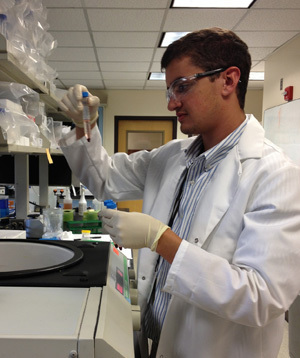
Jeff Hansen
Every month, Notre Dame students gather in the Jordan Hall of Science to learn about ongoing scientific research at the University.
Called Talk Science, this monthly event is organized by Scientia, Notre Dame’s Undergraduate Journal of Scientific Research. Students enjoy pizza and beverages while listening to presentations by undergraduate and faculty researchers. These presentations encourage students to engage with research outside their disciplines and give them a glimpse of a few of the myriad opportunities available for research at Notre Dame. On Wednesday, October 8, students heard from Jeff Hansen and Professor Brian Baker.
Hansen, a senior biological sciences major, secured a research position at Indiana University School of Medicine (IUSM) this summer through the Well’s Internship program. At IUSM, Hansen worked in Dr. Patrick Fueger’s lab and conducted research on diabetes, specifically studying cellular processes within the liver that link a high-fat diet with the onset of Type II diabetes.
Hansen’s research revealed that the presence of excess lipids within a cell induces stress in the endoplasmic reticulum, the cell’s protein-making factory. This stress leads to higher production of a protein called “Mig6,” which in turn knocks out a regulatory protein that controls the production of glucose. In other words, more fat in the cell leads to higher glucose levels, the main culprit for diabetes symptoms. Fueger’s team is continuing research into applications of the results of Hansen’s work.

Brian Baker
The other presenter during the evening was Brian M. Baker, a professor of chemistry and biochemistry and the associate dean of research and graduate studies for the College of Science. Baker’s lab is part of the Harper Cancer Research Institute, and his team studies the mechanics behind the immune system’s molecule-recognition abilities. Using an interdisciplinary approach, one of the Baker lab’s projects focuses on this recognition property to induce an immune response to cancer cells. This practice, known as cancer immunotherapy, is gaining popularity in the scientific community and was Science’s 2013 Breakthrough of the Year.
Working with researchers from around the country, Baker is attempting to identify target molecules that are unique to the cell membrane of certain cancer cells. Injecting a surplus of these molecules, which are harmless on their own, into a patient would encourage proliferation of immune cells that can recognize the molecules. As these immune cells build up, they would begin to recognize the protein as displayed on a tumor cell’s surface. In that way, a person’s immune system would destroy tumor cells present in his or her body. Baker’s lab and his collaborators plan to start clinical trials for one possible treatment within the next few months.
The next Talk Science seminar is scheduled for November 20 at 7:00 p.m. in the Jordan Hall of Science Reading Room.
Originally published by at science.nd.edu on October 17, 2014.